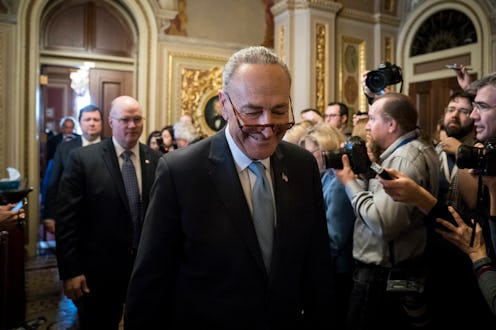News
The Government Shutdown Will Officially End Today (But A Ton Is Still Up In The Air)

The weekend began with the first government shutdown since 2018, when Congress couldn't pass a spending bill to keep the lights on. Now, it's official: the government shutdown will end. Senate Majority Leader Mitch McConnell had attempted to end the shutdown on Sunday night by passing a short-term spending bill, but Senate Minority Leader Chuck Schumer didn't allow that to happen. Both sides hoped that the Monday vote would allow the two sides to come to a more complete agreement on immigration and defense spending.
In a speech Monday afternoon, Schumer spoke to the Senate and confirmed that Democrats would vote to end the shutdown after an agreement was made with McConnell — and he made a point to say that he had not spoken to President Trump about the situation, saying that the president "sat on the sidelines." Schumer said that if a deal on DACA has not been made by Feb. 8, they "will immediately proceed to consideration of legislation to deal with DACA," adding:
The Republican majority now has 17 days to prevent the Dreamers from being deported.
At the core of the 2018 government shutdown is the question of what will happen to the Dreamers, the previously undocumented immigrants who have been allowed to stay in the country and work legally under an Obama era program called DACA. The Trump administration ended DACA and then passed the issue on to Congress, but the Republicans in control of both houses of Congress have been slow to take up the issue.
In order to make it an urgent matter, Democrats then refused to pass a short-term spending bill if it didn't address the fate of the Dreamers. Most Republicans, however, have been reticent to create legislation protecting DACA because of President Trump's wavering opinions on the issue.
Since the last spending ran out at midnight on Friday night, both sides were blaming each other heavily. President Trump has tweeted several times blaming the Democrats, saying, among other things:
Democrats are far more concerned with Illegal Immigrants than they are with our great Military or Safety at our dangerous Southern Border. They could have easily made a deal but decided to play Shutdown politics instead.
On Saturday, which was both the first day of the shutdown and the one-year anniversary of Trump's time as president, he tweeted:
This is the One Year Anniversary of my Presidency and the Democrats wanted to give me a nice present. #DemocratShutdown
The official White House Statement on the shutdown blamed the Democrats, and specifically Sen. Schumer, just as explicitly.
Senate Democrats own the Schumer Shutdown. Tonight, they put politics above our national security, military families, vulnerable children, and our country’s ability to serve all Americans. ... This is the behavior of obstructionist losers, not legislators.
Democrats, however, claim that as the majority party in both houses of Congress and as the party controlling the White House, it was the Republicans' responsibility to put together a spending bill that both sides could accept. They also pointed to Trump's previous statements calling for "a good 'shutdown,'" saying that the Republican president had been difficult to negotiate with on the issue of immigration and that his negotiating strategy seemed to be threatening a shutdown as a means to get the Democrats to concede to priorities of his like funding for the border wall.
"Negotiating with this White House is like negotiating with Jell-O," Sen. Schumer said, referring to Trump's shifting demands.
So far, according to a recent POLITICO/Morning Consult poll, more Americans blame Republicans for the shutdown, though not by a huge margin. Republicans also took most of the blame for the shutdown in 2013, but the bad feelings towards them didn't last long enough to hurt them in the 2014 midterms. As this shutdown occurred in a midterm year, it's likely that candidates on both sides will attempt to use the results to their advantage.
As it stands right now, it looks like Democrats might be the ones who will gain from this. The conversation around DACA will certainly continue, but at least now government employees around the country can go back to work.